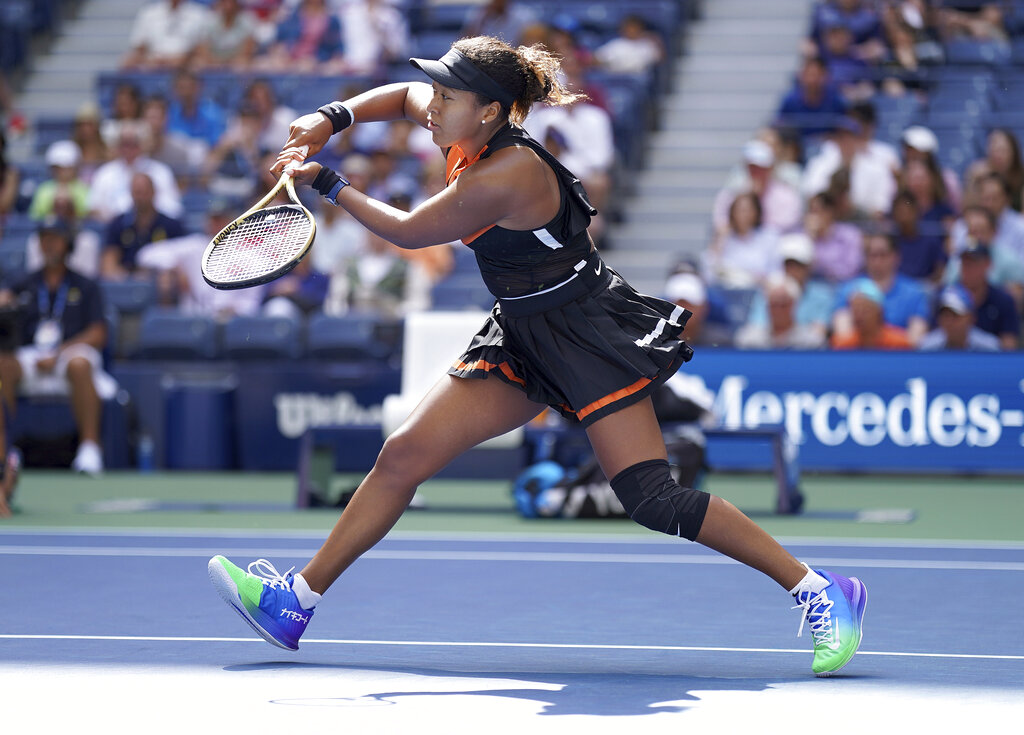Naomi Osaka’s body language tells story of her shaky US Open start

Naomi Osaka, of Japan, returns a shot to Anna Blinkova, of Russia, during the first round of the US Open tennis tournament Tuesday, Aug. 27, 2019, in New York. (AP Photo/Michael Owens)
NEW YORK — Naomi Osaka put her right hand in the shape of a gun and pointed two fingers at her temple. She had just dropped the second set, moments after wasting a match point, as her U.S. Open title defense got off to a shaky start Tuesday.
Her body language told the story: the eye rolls, the kneeling at the baseline, the balled-up fists covering her face at a changeover, the racket resting atop her head.
Article continues after this advertisementBack in Arthur Ashe Stadium, where she beat Serena Williams in last year’s chaotic final, the No. 1-seeded Osaka kept digging holes and kept climbing out of them, eventually emerging with a 6-4, 6-7 (5), 6-2 victory over 84th-ranked Anna Blinkova of Russia in the first round.
“I don’t think I’ve ever been this nervous in my life,” Osaka told the crowd during her post-match interview. “For me, I just came off really slow and I never really found my rhythm.”
The 21-year-old from Japan wore a black sleeve over her left knee, which has been an issue recently.
Article continues after this advertisementBut it wasn’t so much her movement as her erratic strokes that presented problems for Osaka, who finished with 50 unforced errors, more than double Blinkova’s total of 22.
During the professional era, which began in 1968, only two U.S. Open women’s champions have lost in the first round the following year: It happened in 2005 to Svetlana Kuznetsova and again in 2017 to Angelique Kerber — who was beaten by none other than Osaka, ranked 45th at the time and yet to get past the third round at a major tournament.
Osaka thought back to that match Tuesday.
“I could kind of see how stressed out (Kerber) was and that was in my favor,” Osaka recalled. “I don’t want to give people that look.”
This victory, difficult as it was, stretched Osaka’s winning streak in hard-court Grand Slam matches to 15, which includes her run to the titles at Flushing Meadows in 2018 and at the Australian Open in January.
Those helped her become the first Japanese tennis player to be ranked No. 1, a spot she regained this month.
Osaka has spoken rather openly about the struggles she’s had dealing with pressure and expectations this season. She said Tuesday that she hoped figuring out how to get past Blinkova — who is now 0-2 at the U.S. Open and 0-4 against top-10 opponents — would boost her moving forward.
“It helps me a lot, because I learn from the tougher matches,” Osaka said. “It helps me be prepared and try to learn and adjust my game plan.”
CANADA VS. CANADA
Denis Shapovalov and Felix Auger-Aliassime are friends and countrymen — and destined to be perennial opponents at the U.S. Open, it seems.
The two up-and-coming Canadians, young and talented and considered among the best players of tennis’ next generation, met in the first round at Flushing Meadows for the second year in a row. And it was Shapovalov who advanced for the second year in a row.
On Tuesday, the flashy, left-handed Shapovalov, who is 20 years old and ranked 33rd, put together a whopping 28-9 advantage in total winners on the way to a 6-1, 6-1, 6-4 victory against Auger-Aliassime, who is 19 and seeded 18th.
In 2018, Shapovalov advanced to the second round when Auger-Aliassime stopped playing because his heart was racing.
MOVING AHN
Eleven years later, Kristie Ahn finally got back into the U.S. Open.
She’s going to play at least one more match after knocking out a past champion.
Ahn beat 2004 winner Svetlana Kuznetsova 7-5, 6-2, advancing to the second round two years after she thought her pro tennis career would be over.
Ahn qualified for the tournament in 2008 at age 16, but didn’t collect her prize money so she could remain an amateur and play at Stanford, where she helped the Cardinal win the 2013 championship.
Her parents agreed to support her quest to make a career in tennis afterward, with the understanding she’d stop by the end of 2017. But Ahn doesn’t seem like someone ready for the business world with her tennis career taking off.
She lost during U.S. Open qualifying the last three years. But she earned a spot this year by winning the U.S. Open wild card challenge.
After her victory Tuesday, she gave her laundry to her parents, who live nearby, now that she’s hanging around a little longer.
“My Dad was like, ‘So, this is a bit of a problem,'” Ahn said. “I’m like, ‘Oh boy, here we go. He goes, ‘How are you going to get into corporate America if you keep winning?’ He’s like very keen on me like, hanging up my racket, getting a 9-to-5 job or whatever. But I’m going to try to milk this as long as I can.”